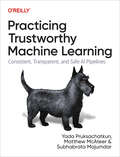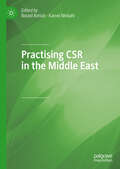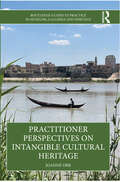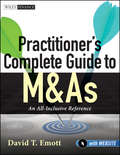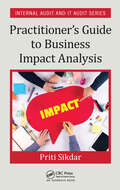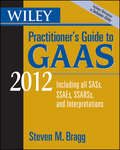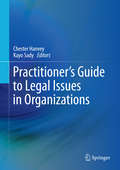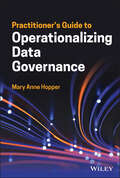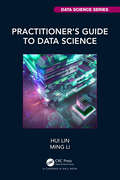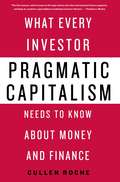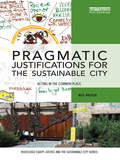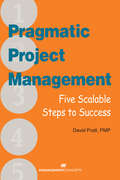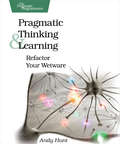- Table View
- List View
Practicing Sustainability
by David Green Barbara Oakley Penny Low Guru Madhavan David KoonSustainability applies to everybody. But everybody applies it differently, by defining and shaping it differently--much as water is edged and shaped by its container. It is conceived in absolute terms but underpinned by a great diversity of relatively "green"--and sometimes contradictory--practices that can each make society only more or less sustainable. In Practicing Sustainability, chefs, poets, music directors, evangelical pastors, skyscraper architects, artists, filmmakers, as well as scientific leaders, entrepreneurs, educators, business executives, policy makers, and the contrarians, shed light on our understanding of sustainability and the role that each of us can play. Each contributor addresses what sustainability means, what is most appealing about the concept, and what they would like to change to improve the perception and practice of sustainability. What emerges from their essays is a wide spectrum of views that confirm an important insight: Sustainability is pursued in different ways not only due to different interpretations, but also because of varying incentives, trade-offs, and altruistic motives. Practicing and achieving sustainability starts with a willingness to look critically at the concept. It also means enabling rich and vigorous discussion based on pragmatism and common sense to determine a framework for best ideas and practices. With time and the much needed critical thinking, sustainable development will become a more integral part of our culture. By sharing experiences and crisp insights from today's savants, Practicing Sustainability serves as a stepping stone to the future.
Practicing Trustworthy Machine Learning: Consistent, Transparent, and Fair AI Pipelines
by Yada Pruksachatkun Matthew Mcateer Subho MajumdarWith the increasing use of AI in high-stakes domains such as medicine, law, and defense, organizations spend a lot of time and money to make ML models trustworthy. Many books on the subject offer deep dives into theories and concepts. This guide provides a practical starting point to help development teams produce models that are secure, more robust, less biased, and more explainable.Authors Yada Pruksachatkun, Matthew McAteer, and Subhabrata Majumdar translate best practices in the academic literature for curating datasets and building models into a blueprint for building industry-grade trusted ML systems. With this book, engineers and data scientists will gain a much-needed foundation for releasing trustworthy ML applications into a noisy, messy, and often hostile world.You'll learn:Methods to explain ML models and their outputs to stakeholdersHow to recognize and fix fairness concerns and privacy leaks in an ML pipelineHow to develop ML systems that are robust and secure against malicious attacksImportant systemic considerations, like how to manage trust debt and which ML obstacles require human intervention
Practicing the Necessary Art of Disengagement: When Discovery-Driven Initiatives Must Be Abandoned
by Ian C. Macmillan Rita Gunther McgrathFor all the effort that you may have put into developing each of the discovery-driven plans in your growth portfolio, it's important to remember that even with great planning and strict discipline, many of your projects are unlikely to achieve commercial success. In pursuing a portfolio of growth initiatives, you will find that, sadly, the bulk of them will never emerge as major growth drivers. If redirecting the project doesn't work, you may conclude that rather than let the project continue to sap organizational resources, you need to bite the bullet and shut it down. But how do you make sure that killing an initiative is seen as a constructive process that allows the company to benefit as much as possible from the investments it has made? This chapter tackles this challenge, and discusses the all-important question of how to handle the inevitably disappointed stakeholders and supporters for the project, as well as the politics of the project-termination decision. This chapter is excerpted from "Discovery-Driven Growth: A Breakthrough Process to Reduce Risk and Seize Opportunity."
Practising CSR in the Middle East
by Kamel Mellahi Belaid RettabEdited by two renowned specialists in CSR in the Middle East, this book features contributions from leading CSR scholars in the region. Each chapter provides a comprehensive and up-to-date discussion of the most pertinent issues within the subject area, and also includes a number of real life case studies addressing emerging and timely CSR topics facing organizations in the Middle East. The book is intended for researchers and students of CSR, providing a state-of-the-art overview of the key themes, best practices and current debates focused upon the Middle East.
Practising Compassion in Higher Education: Caring for Self and Others Through Challenging Times (Wellbeing and Self-care in Higher Education)
by Susanne Garvis Narelle Lemon Heidi Harju-LuukkainenPresenting a collective international story, this book demonstrates the importance of compassion as an act of self-care in the face of change and disruption, providing guidance on how to cope under trying conditions in higher education settings. Practising Compassion in Higher Education presents an opportunity to learn through story and by taking proactive action for our wellbeing. It highlights the need to protect and maintain the wellbeing of staff and students, positioning the COVID-19 pandemic as a major catalyst of disruption. The chapters connect theory with lived experience, exploring self-compassion in work and research, compassion in teaching practice and within the personal/professional blur. The book’s contributors bring a range of theoretical and personal perspectives from various global contexts, sharing their own approaches to self-care and how compassion has become a central and crucial element of this practice. This book takes a unique approach to navigating and surviving the higher education environment and offers valuable lessons for the pandemic era and beyond. This will be an essential resource for students and professionals working in all areas of higher education.
Practising Wood in Architecture: Connecting Design, Construction and Sustainability
by James Benedict Brown Francesco CamilliIn the stark light of the climate emergency, using wood instead of concrete, steel, or masonry is increasingly seen as a way of reducing the environmental impact of architecture and construction. More and more new buildings are showcasing innovative ways to work with wood. Wood can help architects achieve ambitious sustainability targets, including the United Nations’ Sustainable Development Goals.How can architects, student architects, and those in the construction industry better understand the qualities, characteristics, and possibilities of building with wood? Practising Wood in Architecture explores the methods, philosophies, and possibilities of contemporary teaching practices in architecture. This book explores how architecture students are learning to build with wood and interrogates the consequences for architectural practice.Based on original research conducted over two years, the book explores innovative projects that use wood in China, England, Finland, Germany, Mongolia, South Africa, and Switzerland. These case studies demonstrate the many advantages of wood, including its simplicity of use, its affordability, and its sustainability. The book focuses on ongoing initiatives that show the educational and professional impact of the use of wood in architecture and construction by students and professionals alike.
Practitioner Perspectives on Intangible Cultural Heritage (Routledge Guides to Practice in Museums, Galleries and Heritage)
by Joanne OrrPractitioner Perspectives on Intangible Cultural Heritage provides an accessible introduction to the Intangible Cultural Heritage field. Summarising the major changes that have taken place over the last two decades, the book explores ongoing debates and changes in thinking about best practice. Drawing on the author’s own experience of operationalising the UNESCO 2003 Convention for the Safeguarding of Intangible Cultural Heritage in a variety of contexts, Orr also incorporates international case studies from practitioners and provides valuable insights about best practices. Demonstrating that the top-down, state-driven hierarchy for the safeguarding of heritage is starting to shift to a model of shared ownership and values driven by communities and practitioners, the book shows that the notion of the ‘expert’ is also diversifying to include other forms of transmission of traditional knowledge. Orr argues that these different perspectives provide a platform to enrich understanding and knowledge and create a stronger basis for the safeguarding of heritage - both intangible and tangible. Exploring some of the policy developments that have laid the foundations for the future involvement of community and practitioners in the global discourse, the book also suggests how practitioners can expand networks and contribute to the global discourse. Practitioner Perspectives on Intangible Cultural Heritage will appeal to museum curators and other heritage professionals, as well as students and academics engaged in the study of museums and heritage, art, and cultural policy and management.
Practitioner's Complete Guide to M&As
by David T. EmottThe ultimate guide to the ins and out of mergers and acquisitionsPractitioner's Complete Guide to M&As provides the practical tricks of the trade on M&As: what they need to know, what they have to know, and what they need to do. Numerous examples and forms are included illustrating concepts in discussion.Written in a straight-talking styleA highly, practical application-oriented guide to mergers and acquisitionsCovers strategy development; deal flow and target identification; due diligence; valuation and offers; tax structuring; negotiation; and integration and value creation"Presents information using bullet points rather than lengthy narrative for ease of readingNumerous exhibits, forms, and examples are includedThis practical guide takes you through every step of the M&A process, providing all the necessary tools that both the first-time M&A player as well as the seasoned practitioner need to complete a smart transaction.
Practitioner's Guide to Business Impact Analysis (Security, Audit and Leadership Series)
by Priti SikdarThis book illustrates the importance of business impact analysis, which covers risk assessment, and moves towards better understanding of the business environment, industry specific compliance, legal and regulatory landscape and the need for business continuity. The book provides charts, checklists and flow diagrams that give the roadmap to collect, collate and analyze data, and give enterprise management the entire mapping for controls that comprehensively covers all compliance that the enterprise is subject to have. The book helps professionals build a control framework tailored for an enterprise that covers best practices and relevant standards applicable to the enterprise. Presents a practical approach to assessing security, performance and business continuity needs of the enterprise Helps readers understand common objectives for audit, compliance, internal/external audit and assurance. Demonstrates how to build a customized controls framework that fulfills common audit criteria, business resilience needs and internal monitoring for effectiveness of controls Presents an Integrated Audit approach to fulfill all compliance requirements
Practitioner's Guide to GAAS 2012
by Steven M. BraggThe clearest, easiest-to-use guide to understanding GAAS 2012 on the market--fully updated This latest resource to understanding GAAS addresses the toughest part of the job--identifying, interpreting, and applying the many audit, attest, review, and compilation standards relevant to a particular engagement. The only GAAS reference organized according to practitioners' actual use of the Statements on Auditing Standards (SASs), inside you'll find examples and illustrations for testing internal controls, techniques for remaining compliant with each standard, and explanations of the reasons for each pronouncement. A brief identification of each SAS, SSAE, and SSARS, with its effective date and tips on when to apply it A convenient and comprehensive glossary of official definitions, which are usually scattered throughout a standard Behind-the-scenes explanations of the reasons for each pronouncement and brief explanations of the basic ideas of the section Concise listing and descriptions of each standard's specific mandate Easy-to-read capsule summary of interpretations, plus selected AICPA practice alerts and advisories Helpful techniques for remaining compliant with each standard Examples and illustrations for testing internal controls Wiley Practitioner's Guide to GAAS 2012 presents each statement individually, explaining how the standards are related and offering guidance on the entire engagement process in the form of practice notes, checklists, questionnaires, and real-world examples that illustrate how the fundamental requirements of each section are applied.
Practitioner's Guide to Legal Issues in Organizations
by Chester Hanvey Kayo SadyThis highly useful reference outlines best practices in key areas of human resources that are not only fair and equitable, but that can withstand legal scrutiny. Industrial/organizational experts apply their empirical knowledge and practical experience to aspects of HR that are commonly litigated, including broad and specific topics in testing of potential employees, disability issues, compensation and pay equity, and work hours. The book is written to be accessible to readers currently in HR-related graduate-level training as well as HR practitioners with or without background in industrial/organizational psychology. And to add to its utility, chapters feature practical strategies for addressing each of the legal issues presented. Among the topics covered: Measuring adverse impact in employee selection decisions. Using background checks in the employee selection process. Disabilities: best practices for vulnerabilities associated with the ADA. Physical abilities testing. Wage and hour litigation. Clinical psychological testing for employee selection. Conducting compensation equity analyses. Practitioner's Guide to Legal Issues in Organizations brings clear, up-to-date information to graduate students studying human resources, management, industrial/organizational psychology who are interested in legal issues, as well as applied HR practitioners such as industrial/organizational psychologists, human resources generalists, management and labor economists.
Practitioner's Guide to Operationalizing Data Governance (Wiley and SAS Business Series)
by Mary Anne HopperDiscover what does—and doesn’t—work when designing and building a data governance program In A Practitioner’s Guide to Operationalizing Data Governance, veteran SAS and data management expert Mary Anne Hopper walks readers through the planning, design, operationalization, and maintenance of an effective data governance program. She explores the most common challenges organizations face during and after program development and offers sound, hands-on advice to meet tackle those problems head-on. Ideal for companies trying to resolve a wide variety of issues around data governance, this book: Offers a straightforward starting point for companies just beginning to think about data governance Provides solutions when company employees and leaders don’t—for whatever reason—trust the data the company has Suggests proven strategies for getting a data governance program that’s gone off the rails back on trackComplete with visual examples based in real-world case studies, A Practitioner’s Guide to Operationalizing Data Governance will earn a place in the libraries of information technology executives and managers, data professionals, and project managers seeking a one-stop resource to help them deliver practical data governance solutions.
Practitioner’s Guide to Data Science (Chapman & Hall/CRC Data Science Series)
by Ming Li Hui LinThis book aims to increase the visibility of data science in real-world, which differs from what you learn from a typical textbook. Many aspects of day-to-day data science work are almost absent from conventional statistics, machine learning, and data science curriculum. Yet these activities account for a considerable share of the time and effort for data professionals in the industry. Based on industry experience, this book outlines real-world scenarios and discusses pitfalls that data science practitioners should avoid. It also covers the big data cloud platform and the art of data science, such as soft skills. The authors use R as the primary tool and provide code for both R and Python. This book is for readers who want to explore possible career paths and eventually become data scientists. This book comprehensively introduces various data science fields, soft and programming skills in data science projects, and potential career paths. Traditional data-related practitioners such as statisticians, business analysts, and data analysts will find this book helpful in expanding their skills for future data science careers. Undergraduate and graduate students from analytics-related areas will find this book beneficial to learn real-world data science applications. Non-mathematical readers will appreciate the reproducibility of the companion R and python codes. Key Features: • It covers both technical and soft skills. • It has a chapter dedicated to the big data cloud environment. For industry applications, the practice of data science is often in such an environment. • It is hands-on. We provide the data and repeatable R and Python code in notebooks. Readers can repeat the analysis in the book using the data and code provided. We also suggest that readers modify the notebook to perform analyses with their data and problems, if possible. The best way to learn data science is to do it!
Pragmatic Capitalism
by Cullen RocheBeing successful in the modern world of finance requires a more in-depth understanding of our global economies on a macro level. What does a shifting demographic cycle mean? How does the explosive growth of emerging markets matter? Why does the world's population affect my portfolio? Does the global monetary system impact my results this year? How does government intervention in markets impact my strategy? In Pragmatic Capitalism, Cullen Roche explores how our global economy works and why it is more important now than ever for investors to understand macroeconomics. Cullen Roche combines his expertise in global macro portfolio management, quantitative risk management, behavioral finance, and monetary theory to explain to readers how macroeconomics works, and provides insights and suggestions for getting the most out of their investment strategies. This book will uncover market myths and explain the rise of macroeconomics and why it impacts the readers' portfolio construction. Pragmatic Capitalism is a must for any sophisticated investor who wants to make the most of their portfolio.
Pragmatic Justifications for the Sustainable City: Acting in the common place (Routledge Equity, Justice and the Sustainable City series)
by Meg HoldenWhat can justice and sustainability mean, pragmatically speaking, in today’s cities? Can justice be the basis on which the practices of city building rely? Can this recognition constitute sustainability in city building, from a pragmatic perspective? Today, we are faced with a mountain of reasons to lose hope in any prospect of moving closer to justice and sustainability from our present position in civilization. Pragmatic Justifications for the Sustainable City: Acting in the Common Place offers a critical and philosophical approach to revaluating the way in which we think and talk about the "sustainable city" to ensure that we neither lose the thread of our urban history, nor the means to live well amidst diversity of all kinds. By building and rebuilding better habits of urban thinking, this book promotes the reconstruction of moral thinking, paving the way for a new urban sustainability model of justice. Utilizing multidisciplinary case studies and building upon anti-foundationalist principles, this book offers a pragmatic interpretation of sustainable development concepts within our emerging global urban context and will be a valuable resource for both undergraduate and postgraduate students, as well as academics and professionals in the areas of urban and planning policy, sociology, and urban and environmental geography.
Pragmatic Project Management: Five Scalable Steps to Success
by David Pratt PMPScale Your Project Management Efforts to Maximize Success!One size does not fit all in project management. Selecting an approach that is appropriate for the size and complexity of a project is essential to achieving success. Over-managing a small project can bog it down in bureaucracy, while a laid-back approach can lead to disaster on a complex project.Pragmatic Project Management: Five Scalable Steps to Success will help you select the methodologies and tools that will enable you to expend minimum effort to achieve maximum gain on your project. This clearly written guide lays the groundwork with a chapter on project sizing and management scaling and follows with chapters on each of the five essential elements of pragmatic project management:• The project charter• The project team• The project plan• Project issue management• Project status tracking and reportingPractical tips and a checklist are included at the end of each chapter. Use the checklists as you plan and execute your project to keep it on track and to scale.
Pragmatic Strategy: Eastern Wisdom, Global Success
by Zhichang Zhu Ikujiro NonakaPragmatism is enjoying a renaissance in management studies and the social sciences. Once written off as amoral, relativist and opposed to the ideals of Truth, Reason and Progress, it is now regaining influence in public policy, international relations and business strategy. But what can pragmatism teach us about strategy? How can pragmatic strategies help businesses to succeed? This innovative book presents a pragmatic framework for shaping and solving strategic problems in a practical, creative, ethical and finely balanced manner. To achieve this, the authors draw from Confucian teaching, American pragmatism and Aristotelian practical wisdom, as well as business cases across industries and nations, particularly from emerging economies. With significant theoretical depth, direct practical implication and profound cultural sensitivity, the book is useful for executive managers, public administrators, strategy researchers and advanced students in the search for pragmatic strategies in an interconnected, fast-moving world.
Pragmatic Thinking and Learning: Refactor Your Wetware (Pragmatic Programmers)
by Andy HuntPrinted in full color.Software development happens in your head. Not in an editor, IDE, or designtool. You're well educated on how to work with software and hardware, but what about wetware--our own brains? Learning new skills and new technology is critical to your career, and it's all in your head.In this book by Andy Hunt, you'll learn how our brains are wired, and how to take advantage of your brain's architecture. You'll learn new tricks and tipsto learn more, faster, and retain more of what you learn.You need a pragmatic approach to thinking and learning. You need to Refactor Your Wetware.Programmers have to learn constantly; not just the stereotypical new technologies, but also the problem domain of the application, the whims of the user community, the quirks of your teammates, the shifting sands of the industry, and the evolving characteristics of the project itself as it is built. We'll journey together through bits of cognitive and neuroscience, learning and behavioral theory. You'll see some surprising aspects of how our brains work, and how you can take advantage of the system to improve your own learning and thinking skills.In this book you'll learn how to:Use the Dreyfus Model of Skill Acquisition to become more expertLeverage the architecture of the brain to strengthen different thinking modesAvoid common "known bugs" in your mindLearn more deliberately and more effectivelyManage knowledge more efficiently
Pragmatism and the Origins of the Policy Sciences: Rediscovering Lasswell and the Chicago School (Elements in Public Policy)
by William N. DunnAn examination of the origins of the policy sciences in the School of Pragmatism at the University of Chicago in the period 1915-1938. Harold D. Lasswell, the principal creator of the policy sciences, based much of his work on the perspectives of public policy of John Dewey and other pragmatists at Chicago. Characteristics of the policy sciences include orientations that are normative, policy-relevant, contextual, and multi-disciplinary. These orientations originate in pragmatist principles of the unity of knowledge and action and functionalist explanations of action by reference to values. These principles are central to the future development of the policy sciences.
Praktijkorganisatie voor apothekersassistenten
by C.R.C. Huizinga-ArpDeze derde, herziene druk van het basiswerk Praktijkorganisatie voor apothekersassistenten beschrijft alle relevante aspecten van de apotheek voor deze beroepsgroep. Welke producten en diensten levert een apotheek? Wie werken er? Hoe wordt het werk georganiseerd? Aan welke regels moet worden voldaan en welke kwaliteitseisen worden gesteld? Hoe wordt alles betaald?Hoewel de openbare apotheek centraal staat, blijven andere soorten apotheken niet onbesproken. Daarnaast wordt aandacht besteed aan de kosten van de gezondheidszorg. Hierbij komt ook de rol van de zorgverzekeraar aan bod. Een rol die de laatste jaren steeds belangrijker is geworden. Het boek laat zien hoe deze maatschappelijke invloeden het werken in de apotheek beïnvloeden. Relevante informatie uit het voormalige boek Verstrekking en vergoeding is in dit basiswerk verwerkt en aangepast aan de huidige contractafspraken van apothekers met zorgverzekeraars.Praktijkorganisatie voor apothekersassistenten heeft raakvlakken met alle kerntaken van een apothekersassistent. Voor het bieden van farmaceutische patiëntenzorg (kerntaak 1), het bereiden van geneesmiddelen (kerntaak 2), het uitvoeren van organisatie- en professiegebonden taken (kerntaak 3) is immers een goedlopende apotheekorganisatie nodig, die op de juiste manier weet in te spelen op de veranderende eisen van de omgeving.Het boek is niet alleen geschikt voor apothekersassistenten (in opleiding), maar vormt een handig naslagwerk voor iedereen die geïnteresseerd is in de apotheek.
Praktikumsknigge: Der Leitfaden zum Berufseinstieg
by Stefan Rippler Nadine LuckDer Praktikumsknigge erklärt auf knapp 140 Seiten, wie Schulabgänger, Studenten oder auch Absolventen ein Praktikum zum wirklichen Karrierebaustein machen. Von den Spielarten der Praktika (vor, während und nach dem Studium) und ihren teils gravierenden Auswirkungen auf Steuer, Versicherung, Arbeitsrecht und BAföG bis zum richtigen Netzwerken nach dem Unternehmensbesuch. Der Praktikumsknigge beschreibt die Methoden intelligenter Stellensuche, zeigt, wie aus einem selbstkritischen Auftreten eine selbstbewusste Bewerbung wird. Daneben vermittelt er die klassischen „Knigge“-Regeln: Die Kollegen am ersten Tag duzen oder siezen? Aufmucken oder Akzeptieren? Kopieren ohne Ende oder das klärende Gespräch und eine sinnvolle Beschäftigung suchen? Auf Dutzende solcher Fragen gibt der Praktikumsknigge Antworten.
Praktische Preis- und Konditionenpolitik: Sicher kalkulieren, flexibel steuern, rentabel gestalten
by Valentin KailingPreise und Konditionen richtig zu kalkulieren und sie flexibel zu steuern ist eine zentrale Aufgabe für jeden Mitarbeiter im Vertrieb. Denn hier liegen die wichtigsten Gewinntreiber eines Unternehmens. „Praktische Preis- und Konditionenpolitik" liefert dazu hilfreiche Tipps und Anleitungen. Dr. Valentin Kailing, der über langjährige Erfahrungen als Verkaufs-Controller und Leiter Innendienst eines internationalen Konzerns verfügt, erläutert anschaulich an konkreten Beispielen, was Sie über die Beziehung von Listenpreisen, Rabatten, Boni, Warenbeistellungen, Volumen, variablen Kosten, Deckungsbeiträgen und Gewinn sowie Zahlungskonditionen wissen müssen. Zahlreiche leicht nachvollziehbare Rechenbeispiele und Formeln machen die Zusammenhänge deutlich. Eine unentbehrliche Arbeitshilfe für alle Verkäufer im Innen- und Außendienst, die die Profitpotenziale ihrer Arbeit optimal ausschöpfen wollen!Neu in der 2. Auflage: Wissenswertes über das Zusammenspiel von Gewinntreibern und wie der Ausgleich von Fixkostensteigerungen über Volumen oder Verkaufspreis erfolgt.
Prastavik Sthool Arthashastra Second Semester FYBA New NEP Syllabus - RTMNU: प्रास्ताविक स्थूल अर्थशास्त्र दुसरे सत्र एफ.वाय.बी.ए. नवीन एन.इ.पी. अभ्यासक्रम - राष्ट्रसंत तुकडोजी महाराज नागपूर विद्यापीठ
by Prof. B. L. Jibhkate‘प्रास्ताविक स्थूल अर्थशास्त्र’ हे प्रा. बी. एल. जिभकाटे यांचे पुस्तक नागपूर विद्यापीठाच्या नवीन अभ्यासक्रमानुसार तयार केलेले असून बी.ए. प्रथम वर्षाच्या विद्यार्थ्यांसाठी विशेषतः उपयुक्त आहे. या पुस्तकात स्थूल अर्थशास्त्राचे संकल्पनात्मक, व्याप्तिगत, सैद्धांतिक आणि उपयुक्त पैलू स्पष्ट करण्यात आले आहेत. राष्ट्रीय उत्पन्न, मुद्रा आणि तिचे मूल्य, व्यापार चक्र, रोजगाराचे सिद्धांत, सार्वजनिक वित्त व्यवस्था, कर व्यवस्था, महागाई व अपस्फीती, आंतरराष्ट्रीय व्यापार व विनिमय, आर्थिक नियोजन व वृद्धी आदी स्थूल विषयांचे सखोल विवेचन साध्या भाषेत केले आहे. विद्यार्थ्यांना क्लिष्ट वाटणाऱ्या संकल्पनांना उदाहरणांच्या सहाय्याने समजावून देण्याचा प्रयत्न करण्यात आलेला आहे. यामध्ये ‘सूक्ष्म ते स्थूल’ अर्थशास्त्राचा संक्रमण, गृहितकांचा फरक, मूल्यपातळी, आर्थिक धोरणे आणि संपूर्ण अर्थव्यवस्थेचा अभ्यास का आवश्यक आहे, याचे सविस्तर विश्लेषण आहे. याशिवाय आर्थिक समस्यांचे व्यापक स्वरूप, बेरोजगारी, व्यापार चक्राचे परिणाम, व सार्वजनिक हितासाठी तयार केलेले धोरणात्मक उपायही मांडण्यात आले आहेत. पुस्तकाचे वैशिष्ट्य म्हणजे यामध्ये विद्यार्थ्यांच्या गोंधळ टाळण्यासाठी संकल्पनांचे पर्यायी शब्द व इंग्रजी प्रतिशब्द दिले आहेत. परीक्षेसाठी उपयुक्त असलेल्या प्रश्नसंचासह हे पुस्तक विद्यार्थ्यांमध्ये विषयाची गोडी निर्माण करते. हे पुस्तक केवळ शैक्षणिक नव्हे तर व्यवहार्य दृष्टिकोनातून देखील स्थूल अर्थशास्त्राचे महत्त्व अधोरेखित करते.
Prastavik Sukshma Arthashastra First Semester FYBA New NEP Syllabus - RTMNU: प्रास्ताविक सूक्ष्म अर्थशास्त्र पहिले सत्र एफ.वाय.बी.ए. नवीन एन.इ.पी. अभ्यासक्रम - राष्ट्रसंत तुकडोजी महाराज नागपूर विद्यापीठ
by Prof. B. L. Jibhkateप्रास्ताविक सूक्ष्म अर्थशास्त्र हे प्रा. बी. एल. जिभकाटे लिखित पुस्तक रा.तु.म. नागपूर विद्यापीठाच्या बी.ए. प्रथम वर्ष, सेमेस्टर १ च्या नवीन (NEP 2020) अभ्यासक्रमानुसार तयार करण्यात आलेले आहे. हे पुस्तक सूक्ष्म अर्थशास्त्राच्या मूलभूत संकल्पनांचे सुलभ व समजण्यासारखे स्पष्टीकरण करते. यामध्ये मागणी व पुरवठा, उपयोगिता, उत्पादन फलन, किंमत निश्चिती, वितरणाचे सिद्धांत, आणि विविध बाजाररचना यांचा अभ्यास सुसंगत पद्धतीने मांडला आहे. लेखकाने विद्यार्थ्यांना जड वाटणाऱ्या संकल्पना सोप्या भाषेत समजावून सांगण्याचा प्रयत्न केला आहे. आर्थिक संज्ञांची परिभाषा, उदाहरणे आणि आकृतींच्या सहाय्याने विषय अधिक सुलभ झाला आहे. ॲडम स्मिथ, मार्शल, रॉबिन्स यांसारख्या अर्थशास्त्रज्ञांच्या व्याख्यांचा विश्लेषणात्मक अभ्यास यात आहे. हे पुस्तक विद्यार्थ्यांच्या परीक्षाभिमुख तयारीसाठी उपयुक्त ठरणारे असून, आर्थिक संकल्पनांमागील तर्कशुद्ध विचार आणि सामाजिक व्यवहारातील उपयोग या दोन्ही अंगांचा समतोल राखतो. व्यावहारिक दृष्टिकोन, संक्षिप्त उत्तरांची रचना व विविध अभ्यासप्रश्न हे याचे महत्त्वाचे वैशिष्ट्य आहे. त्यामुळे हे पुस्तक बी.ए. स्तरावरील विद्यार्थ्यांसाठी तसेच अर्थशास्त्र विषयाच्या मूलभूत अभ्यासासाठी अत्यंत उपयुक्त आहे.
Pratham - Every Child in School and Learning Well
by Srikant M. Datar Stacey Childress Rachna Tahilyani Anjali RainaThe case focuses on how Pratham, a non-governmental organization, provided quality education to underprivileged children in India by collaborating with the government. It focuses on the problem Madhav Chavan, the founder, is trying to solve, the contributing factors that have caused this problem not to be solved till now, Madhav's theory of change, questions about whether these activities (inputs) will affect the outputs and have an impact, what will it take and how will we know if Pratham is successful, and recommendations about what Madhav should do next.

